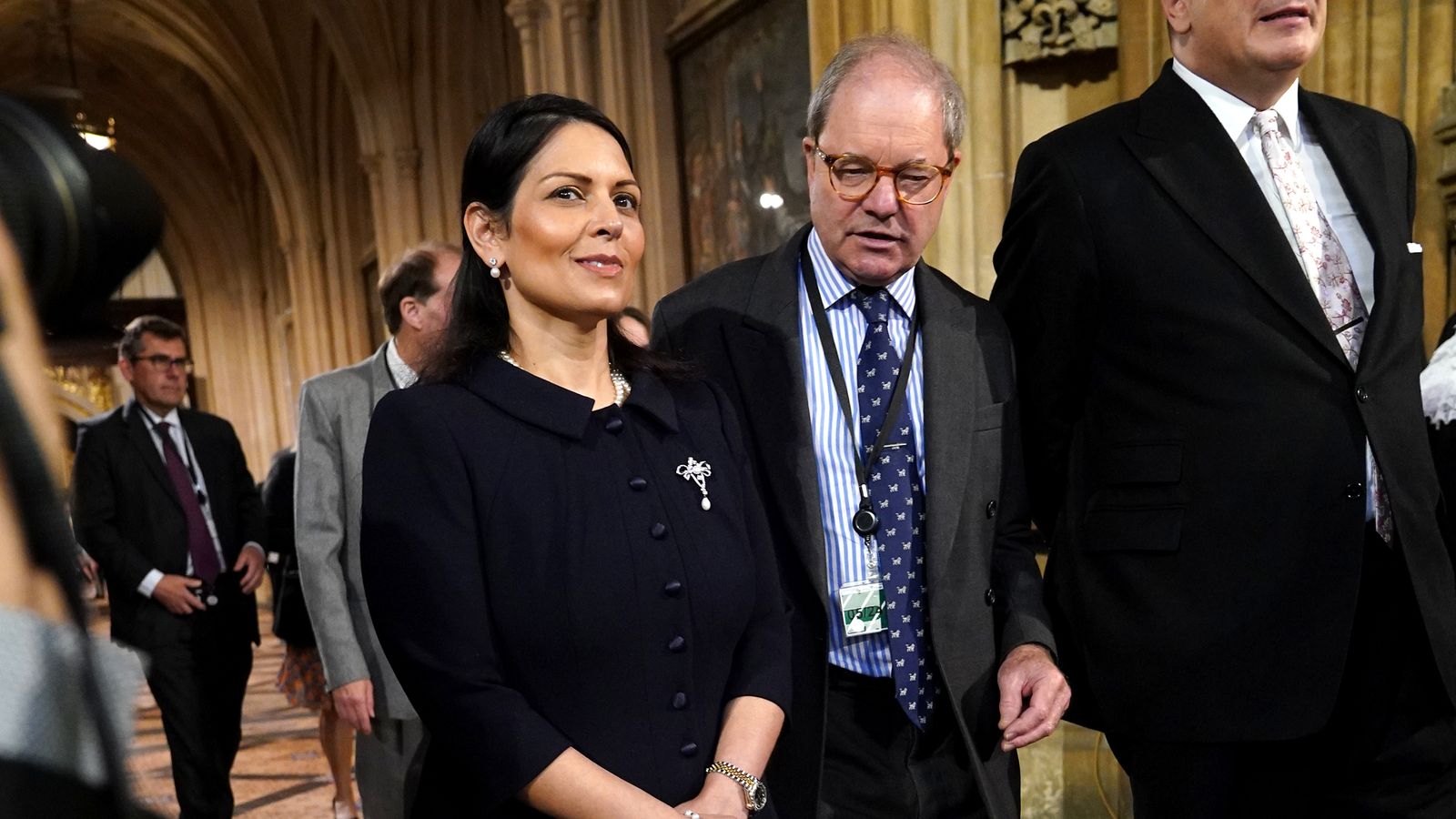Priti Patel has accused Labour MPs of being “eager to defend the murderers, paedophiles, rapists, thugs and those with no right to be here”.
Opening the second day of debate in the Commons on the Queen’s Speech, the home secretary declared that “the Conservative Party is the party of law and order” and said the new Public Order Bill will allow police officers to “prevent severe disruption”.
She also claimed that immigration lawyers and Labour members have previously begged her not to deport “dangerous foreign criminals”.
One of the 38 bills announced in yesterday’s speech – read by the Prince of Wales in the Queen’s absence – the government says the Public Order Bill “backs the police to prevent antisocial protests from disrupting people’s lives”.
Politics live: MPs to debate Queen’s Speech after PM’s ‘beergate’ joke
It particularly targets protest groups including Extinction Rebellion and Insulate Britain which have used disruptive methods to draw attention to the climate crisis, with people who aim to lock themselves or others to buildings, roads or printing presses committing an offence under the new bill.
The home secretary has repeatedly denied accusations that she is attempting to erode the right to protest through the legislation.
Local elections 2022: Signs of a Lib Dem revival may worry Tory MPs more than Labour’s gains in London
Local elections 2022: Voting signals threat to Tory majority but Labour a long way short of seizing power
Local elections 2022: Wandsworth – jewel in Tory crown – snatched by Labour after more than four decades
“The Conservative Party is the party of law and order,” Ms Patel said in her opening remarks in today’s debate which is focused on preventing crime and delivering justice.
“And unlike some we understand that freedom includes the freedom of the law abiding majority to go about their business free from harm.
“Those on the benches opposite are eager to defend the murderers, paedophiles, rapists, thugs and people with no right to be here.
“They cheer on the selfish protesters who cause chaos and endanger lives, they back people who thwart the removal of foreign national offenders from our country and in the last session, parties opposite voted against the police and crime bill and the measures to stop the likes of Insulate Britain ruining the lives of ordinary working people.”
Please use Chrome browser for a more accessible video player
Ms Patel said the new Public Order Bill will be used to combat “guerrilla tactics” used by protesters.
She described the Police, Crime, Sentencing and Courts Act as a “major step forward”, but said some parts of it had been “frustrated by the unelected” House of Lords and opposition MPs.
Controversial measures including police powers to stop noisy protests were repeatedly defeated in the Lords.
Ms Patel added: “We will not be deterred from our duty to protect the law-abiding majority from mob rule and the thuggery that we have seen, and the Public Order Bill combats the guerrilla tactics that bring such misery to the hardworking public, that disrupts business, interferes with emergency services, costs taxpayers millions and puts lives at risk.”
Intervening on Ms Patel, Conservative MP Lee Anderson suggested that environmental protesters should be put to work “seven days a week” as punishment for disruptive tactics.
“The Public Order Bill, as she (Home Secretary) knows, will be music to the ears of many residents in Ashfield. We have seen these eco-whatever-they-are with their little hammers smashing petrol stations up.
“Does she think it is a good idea that we should give them bigger hammers, some tools, and put them to work seven days a week like the rest of us?”
Read more: Every announcement in the Queen’s Speech
Please use Chrome browser for a more accessible video player
But the bill is not without its criticism. Green MP Caroline Lucas is among those who have vowed to work with other parties to defeat the legislation.
Meanwhile, the government says its British Bill of Rights – which will replace the Human Rights Act – will “end the abuse of the human rights framework and restore some common sense to our justice system”.
“Crucially, the Bill of Rights will restore public confidence and curb the abuse of the human rights framework by criminals,” Ms Patel told the Commons.
The home secretary added: “Human rights are not something that should only be extended to criminals. In what has to be the most twisted logic I have seen, as home secretary, I have lost count of the number of representations I have received from immigration lawyers and Labour members opposite begging me not to deport dangerous foreign criminals.”
Ms Patel added that while the UK is a “hospitable” country, “our capacity to support over 18 million people worldwide who are on the move is not limitless”.
“That is why we have developed our world-leading migration and economic development partnership with Rwanda to deter illegal entry,” she continued.
“We are providing solutions to the global migration challenges countries across the world are facing.”
Ms Patel signed a deal in the capital Kigali in April for some asylum seekers who have arrived in the UK illegally since January to be resettled in the east African country.
Meanwhile, shadow home secretary Yvette Cooper accused the government of not preventing crime, telling MPs: “Crime is rising but there has been a shocking drop in prosecutions.”
She also argued that the Home Office “has effectively been put into special measures because it cannot get the basics right”.





